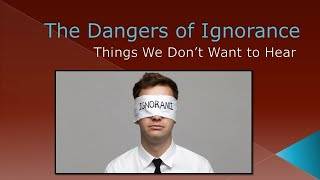The Dangers of Ignorance: How Lack of Knowledge Can Have Devastating Consequences.
Ignorance, defined as the lack of knowledge or awareness, is a pervasive and insidious force that can have far-reaching and devastating consequences. It perpetuates misconceptions, fuels prejudices, and fosters an environment where fear and superstition thrive. Throughout history, ignorance has hindered progress, caused widespread harm, and led to some of the darkest moments in human history.
One of the most notorious examples of the dangers of ignorance is the Black Death pandemic that swept through Europe in the 14th century. The plague, which was caused by the bubonic plague bacterium, decimated Europe's population, killing an estimated 25-30 million people. The lack of knowledge regarding hygiene and disease vectors contributed to the rapid and devastating spread of the plague. At the time, people believed that the plague was caused by bad air, or "miasma," and that it could be treated with remedies such as bloodletting and applying poultices to the affected areas.
The ignorance of medical professionals and the general public allowed the plague to spread unchecked, leading to one of the deadliest pandemics in human history. The plague had a profound impact on European society, leading to significant social, economic, and cultural changes. It also led to increased persecution of minority groups, such as Jews, who were blamed for the outbreak of the plague.
The Black Death pandemic is just one example of how ignorance can have devastating consequences. Throughout history, ignorance has led to the persecution of scientists, the suppression of knowledge, and the hindering of progress. During the Dark Ages, scientists such as Galileo Galilei and Johannes Kepler were persecuted for their beliefs about the universe, which challenged the prevailing views of the time. The ignorance of the Church and the general public led to the suppression of scientific knowledge, hindering progress and leading to a period of intellectual stagnation.
In modern times, ignorance continues to have significant consequences. The spread of misinformation and disinformation has become a major problem, leading to the manipulation of public opinion and the hindering of progress. The internet and social media have made it easier for misinformation to spread, allowing false information to reach a wide audience quickly. This has led to the proliferation of conspiracy theories, the spread of false information about scientific topics such as climate change and vaccination, and the manipulation of public opinion.
The consequences of ignorance are not limited to the individual or community level. Ignorance can also have significant consequences at the national and international levels. The lack of knowledge and understanding of different cultures and societies can lead to conflict, mistrust, and misunderstanding. The ignorance of world leaders and policymakers can lead to poor decision-making, hindering progress and leading to conflict.
In conclusion, ignorance is a pervasive and insidious force that can have far-reaching and devastating consequences. It perpetuates misconceptions, fuels prejudices, and fosters an environment where fear and superstition thrive. Throughout history, ignorance has hindered progress, caused widespread harm, and led to some of the darkest moments in human history. It is essential that we recognize the dangers of ignorance and take steps to promote knowledge, understanding, and critical thinking. By doing so, we can create a more informed and enlightened society, where progress and understanding can flourish.
To combat ignorance, it is essential that we promote education and critical thinking. Education is the key to unlocking knowledge and understanding, and it is essential that we make education accessible to everyone. Critical thinking is also essential, as it allows us to evaluate information, identify biases and misconceptions, and make informed decisions. By promoting education and critical thinking, we can create a more informed and enlightened society, where progress and understanding can flourish.
In addition to promoting education and critical thinking, it is also essential that we promote media literacy and critical consumption of information. The spread of misinformation and disinformation has become a major problem, and it is essential that we take steps to combat it. By promoting media literacy and critical consumption of information, we can empower people to evaluate information critically, identify biases and misconceptions, and make informed decisions.
Finally, it is essential that we recognize the importance of empathy and understanding in combating ignorance. Empathy and understanding allow us to see things from different perspectives, to challenge our own biases and misconceptions, and to make informed decisions. By promoting empathy and understanding, we can create a more informed and enlightened society, where progress and understanding can flourish.




No comments yet
Be the first to share your thoughts!